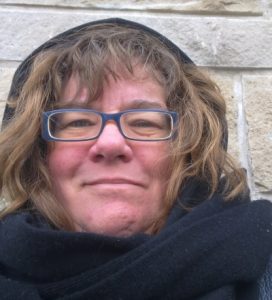
About Alison Bruce:
Alison Bruce writes history, mystery and suspense. Her books combine clever mysteries, well-researched backgrounds and a touch of romance. Her protagonists are marked by their strength of character, sense of humor and the ability to adapt (sooner or later) to new situations. Four of her novels have been finalists for genre awards.
Copywriter, editor and graphic designer since 1992, Alison has also been a comic book store manager, small press publisher and web designer. Currently, she is the Executive Director of Crime Writers of Canada.
What inspires you to write?
When I was twelve, I wrote a short story about the end of the world that inspired my teacher to call my mother to make sure I was okay. I thought that was pretty cool. My writing could affect people. I was hooked.
Tell us about your writing process.
Before I get too invested in an idea, I start writing the story. Once I know that it has potential, I start outlining a loose plotline, do character sketches for my protagonists and start researching what I need to know to write the story. Sometimes that's as far as it goes. If I find a fatal flaw in the premise or decide I can't live with the characters, that story gets put aside. If it survives, I go back and forth between writing, researching and tweaking the plot until it's done. The closer I get to the end, the more I spend time just writing, but I'll stop to fact check right up to the last page.
For Fiction Writers: Do you listen (or talk to) to your characters?
I was Live Action Role Playing before LARP was a gaming thing. I don't just talk to my characters, I roleplay them. Mostly I do it in my head…but not always. (My kids stopped asking questions about that years ago.)
What advice would you give other writers?
With apologies to Yoda, "Once you have gone to the "write" side, forever will it dominate your destiny." You don't always have to enjoy writing or even like it, but you better love it because it requires a lot of time, effort and heartache (especially during the editing process). Be prepared. Being an author is a lot more than just being a writer. Authors also need to be publicists, bookkeepers, public speakers and salespeople. It can be daunting if you don't love what you do.
How did you decide how to publish your books?
I used to be a publisher and I know how much work goes into producing a book. When we closed the business and I started turning my attention back to fiction, I had no desire to self-publish. That was before ebooks took off. I still think it's better to start with a publisher. Becoming an author is a steep enough learning curve without being a publisher as well. It's a big investment to do it properly. You need an editor (you really can't edit your own writing and shouldn't try and I speak from being a professional editor). You need a cover designer unless you are also a graphic designer who understands the elements of cover design (there's more to it than meets the eye). Then there's formatting, legal issues, marketing… I'd rather be writing.
What do you think about the future of book publishing?
I know what I would love to see. I'd like to see the number of midsized publishers grow. I find it disturbing that so much is published by so few. I'd like to see more choices available to readers and authors.
What do you use?: Professional Editor, Professional Cover Designer, Beta Readers
What genres do you write?: mystery, romantic suspense, paranormal suspense, historical romance
What formats are your books in?: eBook, Print, Both eBook and Print
Website(s)
Alison Bruce Home Page Link
Link To Alison Bruce Page On Amazon
Your Social Media Links
Goodreads
Facebook
Twitter
Pinterest
LinkedIn
Instagram
All information in this post is presented “as is” supplied by the author. We don’t edit to allow you the reader to hear the author in their own voice.
